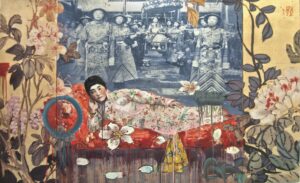Diasporic Avant-Gardes:
East Asian Transitions in Form and Genre
ACLA Virtual Conference, 15–18 June 2022
GUESTS WELCOME WITH REGISTRATION/SEE BELOW
NOTE REVISED SEMINAR SCHEDULE
Organized by Barrett Watten, Wayne State University
and Lauri Scheyer, Hunan Normal University
Seminar program
Session 1: Diasporic Regions
Thursday June 16, 8:30–10:15 AM PDT/11:30 AM–1:15 PM EDTIntroduction: Diasporic Avant-Gardes
Barrett Watten, WSU: “East Asian/Asian American: Displacement and Innovation in Hung Liu’s Collective Portraits and Tao Lin’s Autofictions”
David Perry, NYU Shanghai: “Internal Migrations, Deep-Time Retreats, and Solastalgia: Anthropocenic Arrivals, Departures, and Exile in 21st Century Avant-Garde Mainland Chinese Poetry”
A.J. Carruthers, Nanjing U: “Avant-Garde Austalgia”
Session 2: Transition/hybridity
Friday June 17, 8:30–10:15 AM PDT/11:30 AM–1:15 PM EDTLauri Scheyer, Hunan Normal U: “Asian American/East Asian Identifications with African American Poetry”
Katie Bradshaw, U Tennessee: “The ‘Dragging Foot’ of José Garcia Villa’s Performative ‘Comma Poems’”
Carla Harryman, Eastern Michigan U: “Reciprocal Echoes of Citation and Photographic Document in Mary Kim Arnold’s Essay ‘Litany for the Long Moment’”
Edwin Torres, Poet New York: “The Inter-Lingo of Language-Seeing: between what is heard and what is held onto”
Session 3: Translational Avant-Gardes
Saturday June 18 / 8:30–10:15 AM PDT/11:30 AM–1:15 PM EDTLucas Klein, Arizona SU: “‘Rivers of When, Why, and What’: Translational Sinophone Poetry”
Spencer Lee-Lenfield, Yale U: “Diasporic Translation and Historical Emplacement: Emigrant Translators between Korean and English”
Katharine Streip, Concordia U: “J’écoutais les cygnes: Theresa Hak Kyung Cha’s Alchemical Dictation”
Hyunjung Kim, Texas A&M U: “Don Mee Choi’s Salivary Poetics: (Non)silent Translation of Kim Hyesoon’s Poetry”
Registration
For the complete program and to register, click here.
Guests are welcome to attend and participate in the sessions. Conference registration allows participation in multiple events; only organizers and presenters need to be members of ACLA.
Session proposal
This seminar continues the work of Diasporic Avant-Gardes: Experimental Poetics and Cultural Displacement (ed. Barrett Watten and Carrie Noland; Palgrave, 2009)—a collection of essays addressing the intersection of diasporic literatures and the European avant-garde, with examples from African, Maghrebi, Jewish, and Hispanic diasporas. A decade later, much new work has appeared on innovative forms and genres of poetry, prose, visual art, and media reflecting the diasporic experience of East Asians over two centuries of global migration. On the one hand, the emergence of self-described avant-garde movements that engage and depart from the Euro-American model, particularly in Japan and China but at differing moments in the 50s/60s and 80s/present, has been recognized in major exhibitions. Global figures such as Yoko Ono, Yayoi Kusama, Ai Wei-wei, Cai Guo-qiang, and Huang Yongping critically address issues of material form, cultural translation, commodification, economic dispossession, and global migration. The work of experimental East Asian poets such as Kim Hyesoon, Ito Hiromi, and Hsia Yu opens the way toward a developing canon of women authors in translation and has led to critical reflection on translation itself. Asian American poets with differing histories of emigration have developed a range of innovative forms, from authors such as John Yau, Mei-mei Berssenbrugge, Pamela Lu, and Tan Lin to Don Mee Choi, Sawako Nakayusa, Mary-Kim Arnold, and Ocean Vuong. New prose genres have appeared after the examples of Maxine Hong Kingston and Yoko Tawada in innovative fictions by Tao Lin, Eugene Lim, and Karen An-hwei Lee. The reception of Asian American visual artists from Nam June Paik, Theresa Hak Kyung Cha, and Tehching Hsieh to the current exhibition of Hung Liu points toward the global transition of strictly Eurocentric theories of the avant-garde. This seminar seeks papers that explore individual artists and movements; reflects on their innovations of form and genre; and theorizes experiences of cultural distinctiveness in terms of migration, displacement, cultural heritage, appropriation, linguistic and stylistic hybridity, radical iconoclasm, and syncretic identity—seen in a productive dialogue with or a decisive reconceptualization of Euro-American avant-garde movements.
Contact barrett.watten@gmail.com for more information
Notes and links
Image: Hung Liu, Imperial Garden, 2014. Cast resin and mixed media on box. Triptych, overall: 60 x 97″. From Dis/Placements Response/The Work of Hung Liu, Halsey Institute of Contemporary Art; website here.













